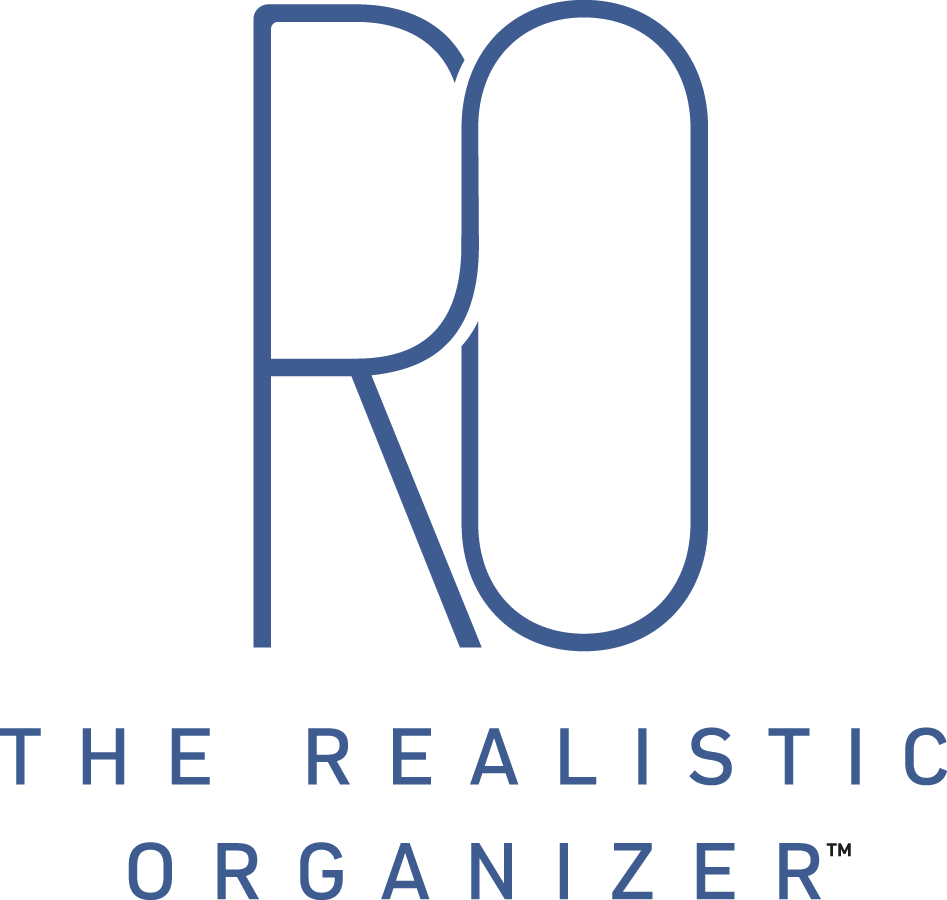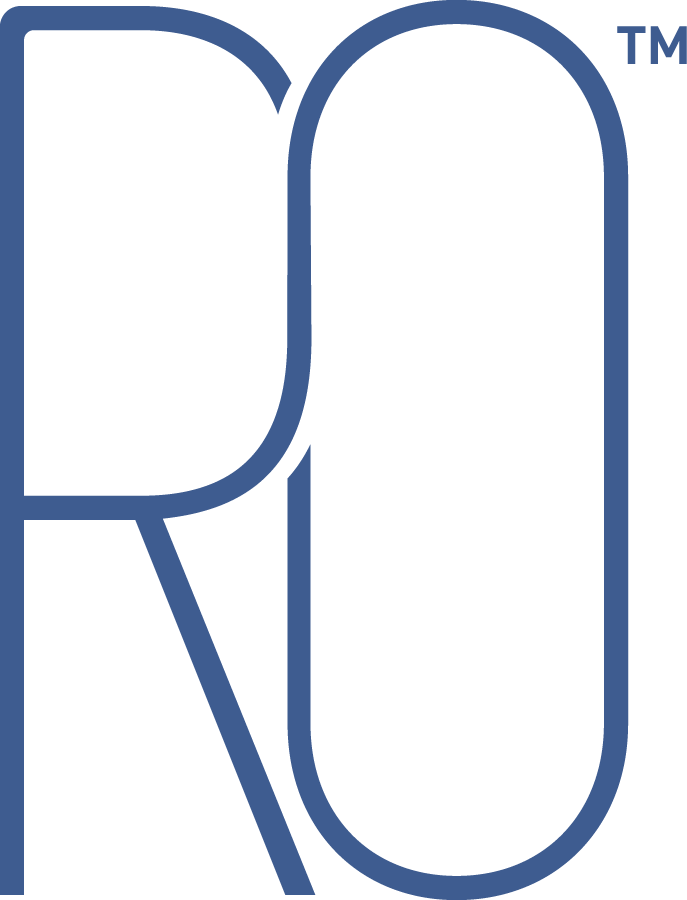How to Organize Paper Clutter and Files
Disclaimer: I am not an expert. This is based on personal research from reputable sites (they're sourced within).
This post has been a long time coming. It started out as a Realistic Reader submission (remember those?!). I got super motivated from a reader, wrote up a huge post sharing what they submitted and how it helped me, and then the post vanished into the interwebs somewhere. I threw a little hissy fit and stubbornly refused to rewrite the post until now, nearly a year later!
After a very rough day with a fever-ridden toddler, I needed to unwind and decompress, and since wine isn't an option right now, that meant getting into a serious organizing project. Although I had organized our files over a year ago, I realized I needed to tackle it again!
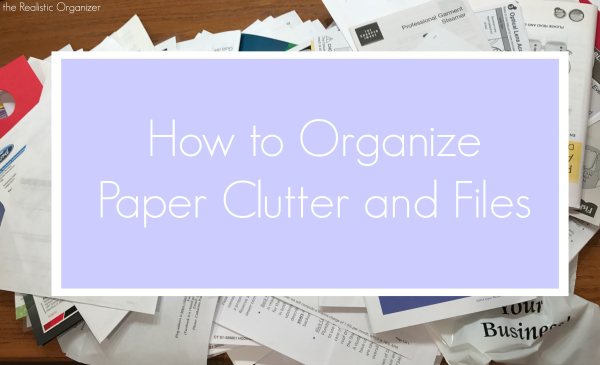
Even in today's tech savvy world, paper is a huge source of clutter. Despite going paperless with bills and bank/credit card statements, we still receive SOMETHING in the mail each day. And our filing drawer, located in the kitchen, was not really serving it's purpose nicely. Almost everything we were filing in there could be moved to a more secure and more practical location, or be tossed out completely.
After some research, here is the information I was able to find on what to do with paper clutter and how to file what you keep.
What to Keep Safe
To start regaining control of your paper clutter, it's best to begin by sorting out what you know for a fact you need to keep. Here is what you should always hang on to. These items don't necessarily need to be kept in a filing drawer, as they are rarely accessed, however they should not be thrown away. It is important to have the originals of these items, so keeping them in a safe place is ideal. A safe place can be an actual safe, a safe deposit box, or somewhere out of reach for little hands, or that is unlikely to be damaged in a fire or flood.
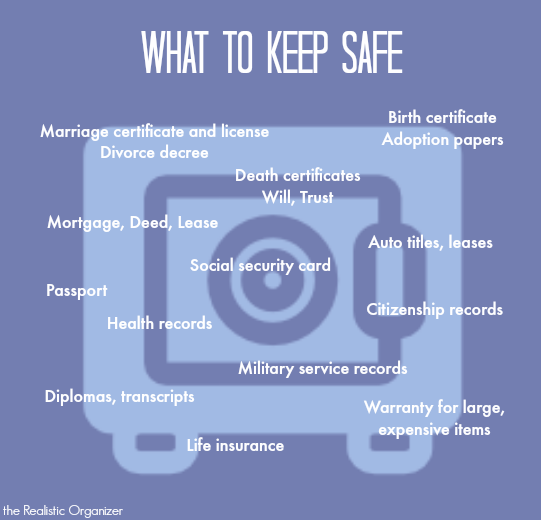
All of these items may not pertain to you, woo-hoo! Less for you to store. But also think about how you use these items. For example, if you travel abroad frequently it may not make sense for you to store your passport in your safe deposit box. Or if you have an infant, storing their immunization record in the safe would be a hassle as they're going to the doctor all the time for updated shots. So think about these items and how it makes the most sense for you to store them. Just don't throw them away!
A Note on Health Records
This does not mean you hang onto every sticker your child receives when they go to the pediatrician. But you should keep a record of their immunization history, as well as yours. Your doctor most likely has this in their record as well, however it can be necessary to have easy access to this information. For how long? Well, even colleges want to know your child's immunization history, so for as long as they're a child under your roof, at least. Additionally, you should keep a record of any major medical surgeries, any allergy information, and medications that are taken regularly.
What to Toss and When
Oh my gosh I just want to throw out everything! But there are certain "rules" for when to throw things away. Here is a simple breakdown, but be sure to read the detailed information below the image!
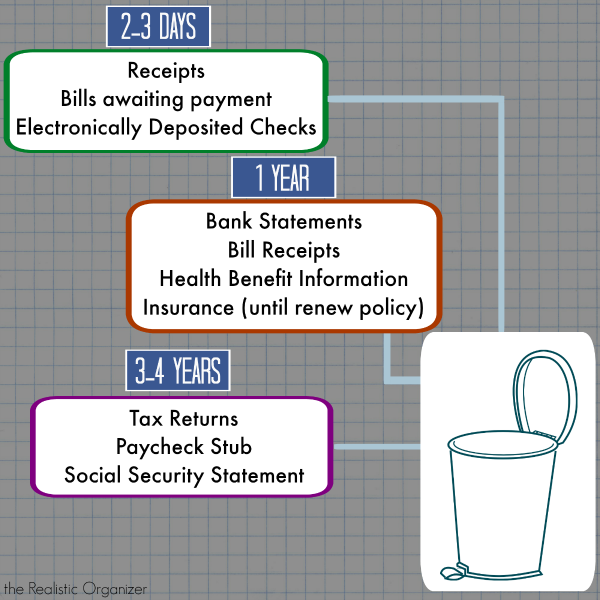
Toss After 2-3 Days
Receipts - Most receipts can be tossed immediately unless you are planning to return the item, it's for expense reimbursement, or it's for a large purchase (see what to keep safe).
Bills awaiting payment - Pay the bill, once it's cleared you can toss the record. If the company you’re paying doesn't have a website, you can hold onto the record for one year. Otherwise, your bill payment information will be available online and there is no need to keep a paper record for yourself. (If you don't trust the website or there isn't one, see the Going Paperless section below.)
Electronically deposited checks - Most banks allow you to deposit checks simply using your smart phone now. It can be hard to get used to the idea that you can throw away a check, but you can. Once the check is cleared, typically 2-3 days, you can toss the check. When I deposit a check I write "deposited" in pencil on the front of the check, put it in a file for a few days, then when I receive the email that my check has cleared I rip up the check and toss it. I write "deposited" in pencil because it has happened that I've deposited the check and the bank writes back that they need a clearer photo, so this way the writing can be erased if need be.
Toss After 1 Year
Bank Statements - Your bank statements are stored electronically on your account page, but if you're a paper person you really only need to keep your statements for one year unless they'll be needed for your taxes. Refer to the dreaded Taxes section for more info.
Bill Receipts - If you've switched to paperless billing this information is available online and there is no need to keep it. If you are still receiving paper billing, keep it for one year, ensure the annual statement matches what you've paid, then shred the record. Exceptions include large purchases like jewelry, furniture, appliances, computers, etc.
Health Benefit information and Insurance - You can toss this in the same way as bills and bank statements. Once you renew your policy, typically annually, you can shred the paperwork.
Toss After 3-4 Years
Tax Returns - there's an entire section on this, see it below.
Paycheck stub - You want to hang onto the stub for tax purposes actually. Honestly, as long as each year your stubs match your W-2, there shouldn't be an issue (hence why I throw mine out each year), but the IRS says to keep just in case.
Social Security Statement - Just keep this until you receive a new statement.
Taxes
Ugh, I think I could write up an entire post just on what to do with tax information. There are so many conflicting opinions out there, and even in our own home. Brit says keep everything, in case we're audited. I say toss everything, no one is going to audit a "retired" social worker/stay at home mom/part-time worker. So I finally did all the research, I read all the things, and here's what I/the IRS came up with.
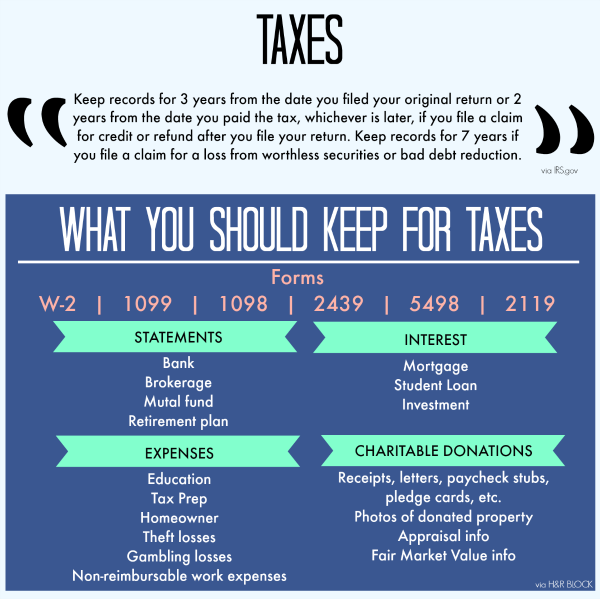
In an effort to keep this post brief, or at least not quite novel length, I am just going to share the two super helpful links I found regarding tax information. This one links directly to the IRS and what they have to say about how long to keep records. If you don't trust the IRS, here is another site I found useful.
Going Paperless
A lot of sites suggest buying a scanner and scanning all of your documents. Here's my two cents, save your money and download Scannable. It's the easiest app and owned by Evernote (another organizers dream app for to-do list). You simply hover your phone over the document, the app takes a photo and you're finished. The app even cleans up the file to make it more presentable (if you spilled coffee on the paper, it won't pick up the coffee marks)!
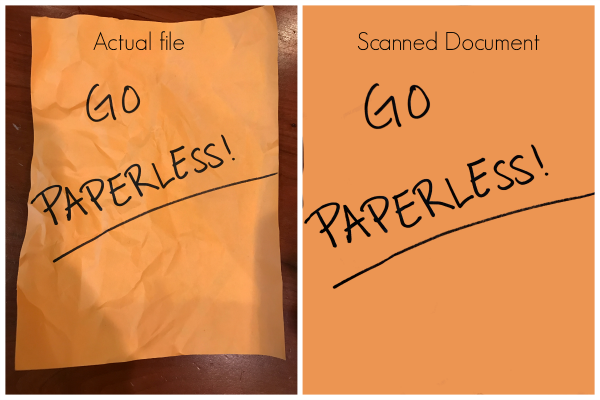
You can upload the file via email, Evernote, Dropbox, Google Drive, iCloud Drive. Personally, I use Dropbox and Google Drive to store files. Technically I could use only one of them and be perfectly happy, I jus have several different gmail accounts so accessing certain drives from my phone can be a pain, hence the Dropbox use as well. All this to say, I highly recommend ANY of the listed online storage sites. They're great places to store data, safe, and provide plenty of space for free.
Once a file is scanned and stored, it's ok to toss it. DO NOT toss original, legal documents (basically anything on the lists above). Also, if you sign up for paperless billing/banking you can avoid that headache altogether. Most companies will encourage paperless billing, and some even offer discounts when you sign up!
Stop Junk Mail
Ok, this section title is slightly deceiving as it won't stop all junk mail, but this website can help stop at least some of it. OptOutPrescreen is a site that will allow you to remove yourself from all "firm offers" from creditors or insurers. If you look at your mail each day, how much of it is a company telling you to "sign up and get $100" or something like that? If you didn't request this information, you can stop it. This won't stop 100% of junk mail and offers, we do still get some from companies we already have accounts with, however it cuts it down tremendously!

After all the research and organizing, here's how much we reduced from our files.
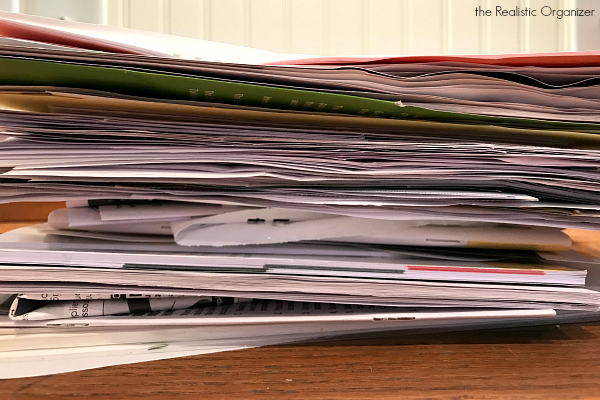
Now I'm stuck with deciding how to use all this extra space in our filing drawer! We narrowed our files down to these main tabs:
Deposited Checks - Where we toss the checks waiting to be cleared.
Bank Information
Car Information
Furniture - This is also where I keep the paint colors for our home.
Health Insurance
Property Insurance - For car and home.
Mortgage - Although we've gone paperless and autopay, they still send us a bill every month, so we store them here, just in case.
Pediatrics - James' health information.
Security Information - We like to have this easily accessible just in case something happens with our alarm.
Tax information - Dating back to 2012.
Before on top, After on bottom
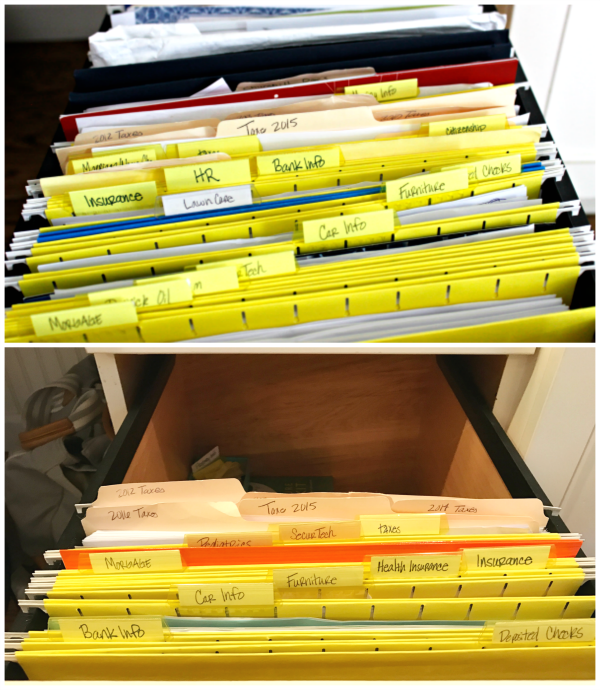
Everything else is either online or in a safe place. Although I would have loved to use this drawer for something else and remove all paper files from the kitchen, this is what happens when I try to get something accomplished during awake hours.
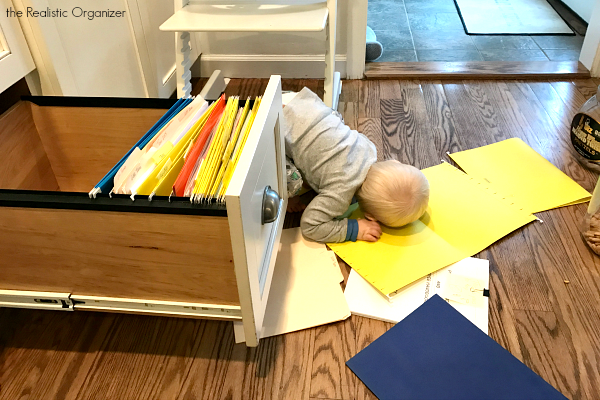
And that's all I have to say about that! This post was long, I know, I'm sorry. If you are a financial expert, tax consultant, paper guru {Michael Scott}, I apologize for this post as I'm sure there are errors. Please share information in comments if you know something I didn't mention here, just please, please, please be kind :) :)
Also, now that I'm over my childish tantrum regarding the disappearing post, I'm accepting Realistic Reader submissions again! So if you have an organizing project, a trick you do to keep organized, or anything else to share, submit it to stefanie@therealisticorganizer.com! I LOVE reading and sharing your ideas, and trust me, even if you think it's super simple, it will likely be helpful to at least one other person!

Thanks for visiting!
